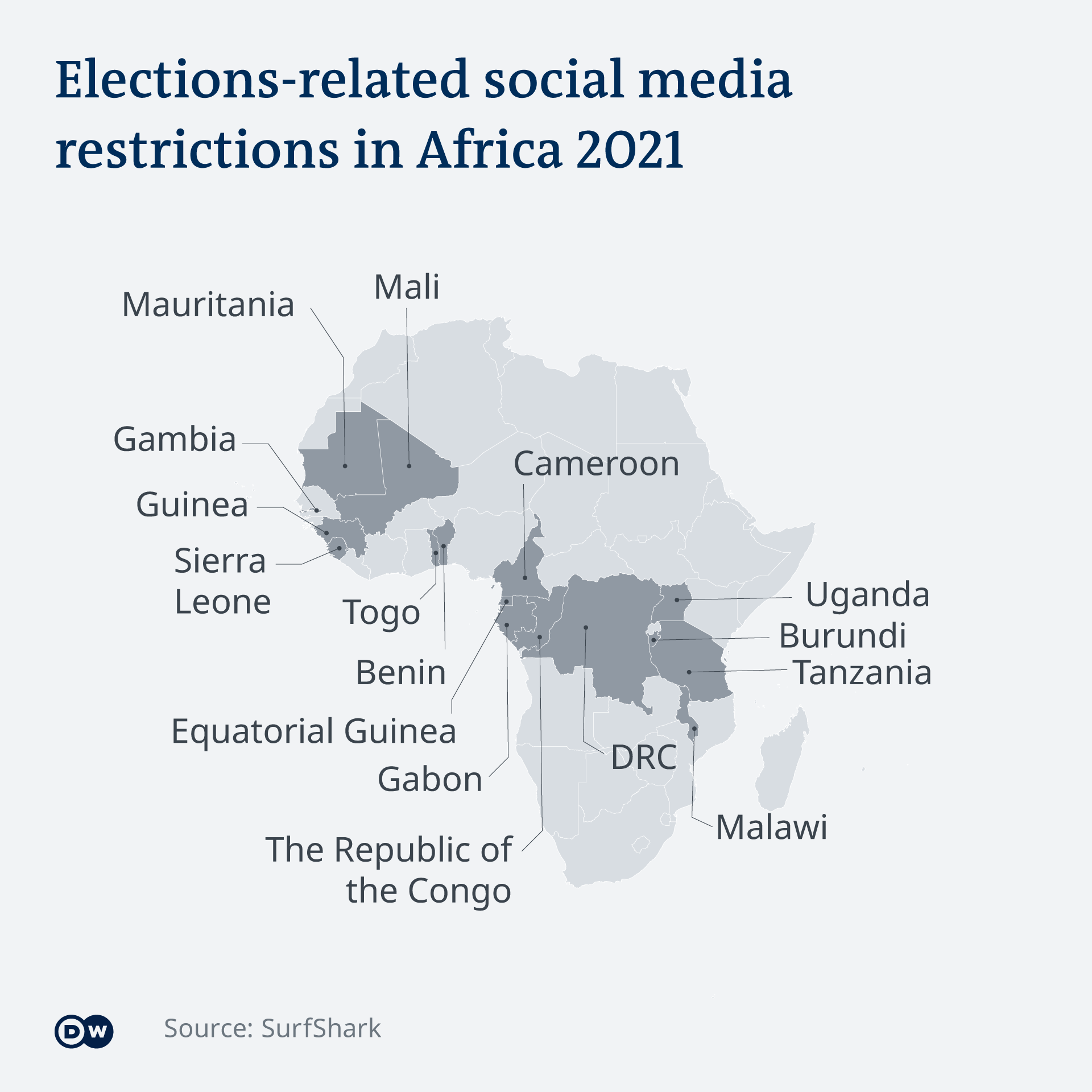Increased social media use puts African leaders on edge

Africans are taking to WhatsApp, Facebook and Twitter in ever greater numbers to voice their opinions. Many of their leaders aren't happy about this.
In the latest example of an African nation threatening a social media shutdown, South Sudan said last week it may be forced to close down Facebook and Twitter as users were abusing social media by creating panic.
Estimated at around 4% in January 2022, the number of social media users in South Sudan is low.
But those who do have social media access, mainly urban youth, are turning to social media to criticize the government of President Salva Kiir and First Vice President Riek Machar.
Ter Manyang, the executive director of the local non-profit Center for Peace and Advocacy, said that the government shouldn't rush to threaten social media closures.
People are traumatized and frustrated, he warned, from the years of devastating conflict, and such threats "won't help society move forward."
Growth in social media use
People across Africa are increasingly adopting social media as mobile internet coverage expands and smartphones drop in price.
Around 12% of sub-Sahara Africans were on Facebook in 2020, one of the most popular apps behind WhatsApp and YouTube.
Nearly one in two people in sub-Saharan Africa owned a smartphone and more than one in four had mobile internet access in 2020, according to mobile phone industry organization, GSMA. This is around double the rate for both statistics compared to 2014.
Fear of social media
The rising social media use is making African leaders uneasy.
"A lot of African governments are really scared of their citizens being able to express themselves more freely than ever before," said Edetaen Ojo, Executive Director of Lagos-based Media Rights Agenda.
Citizens can now directly discuss "issues of governance and the performance of government using a variety of social media platforms without intermediaries or mediation," Ojo said.
"This is not a power that many governments like their citizens to have."
When it comes to social media censorship, Africa is the most restricted region in the world, according to a 2021 analysis by the cybersecurity company SurfShark.
The continent was responsible for 53% of of social media restrictions in 2021, with targeted apps including WhatsApp, Facebook Messenger, Facebook, Twitter and Instagram.

Of the 54 countries on the continent, 34 of them, or 60% have blocked access to social media in platforms since 2015, SurfShark found.
And although social media shutdowns mainly happen against the backdrop of protests, elections and other moments of political dispute, most governments justified "restricting social media due to security reasons," according to SurfShark.
Chad, for example, disrupted the mobile internet in the capital N’Djamena in February 2021 following a deadly raid by security forces on the property of presidential opposition candidate Yaya Dillo.
The year before, the government had restricted WhatsApp after an army officer killed someone in N’Djamena.
Congo, Uganda and Zambia restricted social media in 2021 during or after elections.
Chad, Ethiopia, Nigeria and Sudan turned off social media during general political turmoil.
Egypt, Eritrea, Mali, Sudan, and Zimbabwe are also guilty of shutting down social media access temporarily within the past five years.
The Ugandan government is doing more than just banning social media. Not only is Facebook banned in the country, mobile data is also highly taxed – this is widely seen as effort by the government to control the internet.
Social media: more than views and opinion sharing
Governments also target social media as a way to crack down on the organization of offline actions such as anti-government protests.
South Sudan, Burkina Faso and Senegal are among those countries who have shutdown social media within the past five years during periods of social unrest and widespread demonstrations.

In South Sudan, for example, the internet monitoring organization NetBlocks reported significant disruptions to the country's mobile internet in August 2021 that coincided with a call for protests against President Kiir and his deputy Machar.
Media freedom expert Ojo warns that governments shouldn't think that "whenever they are embarrassed or uncomfortable, they can simply shutdown social media platforms or clampdown on citizens that are using them."
He called for Africans to "forcefully" speak out against social media shutdowns even when they are in another African country.
On top of this, he says, people and organizations should legally challenge shutdowns by taking them to court, pointing out that regional courts and the African court also offer possibilities to lodge social media rights cases.
"The more [governments] realize that, whenever they violate the human rights of citizens … they are likely to be challenged, that would put a restraining factor on the situation," he said.
Waakhe Simon Wudu in Juba, South Sudan contributed to this report.
Editor: Kate Hairsine







